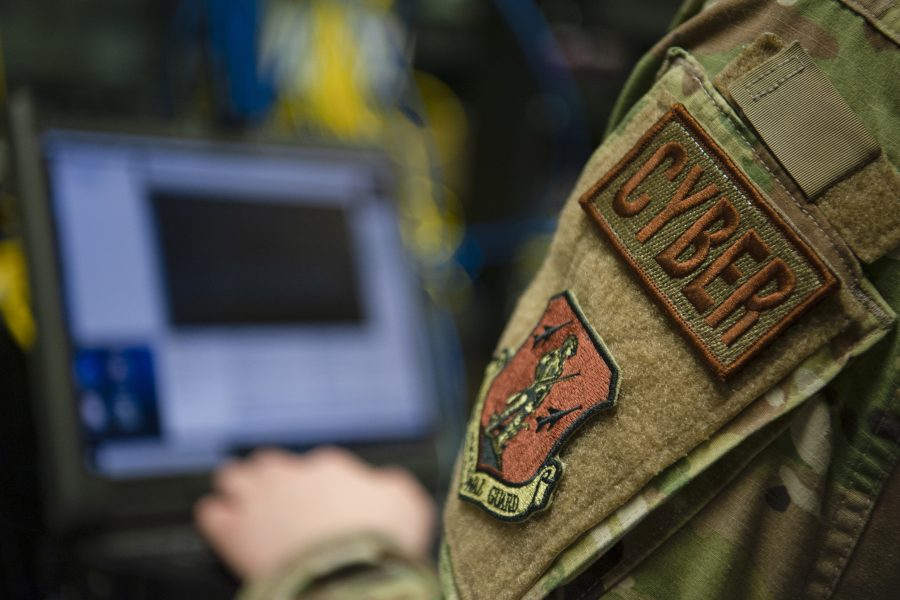AURORA, Colo.—The Air National Guard will play a vital role in the Air Force’s new warrant officer track, the ANG’s boss said at the AFA Warfare Symposium.
“In the first class of warrant officers, we are going to bring National Guard professionals into that warrant officer corps,” director of the Air National Guard Lt. Gen. Michael A. Loh said in an interview with Air & Space Forces Magazine.
With its warrant officer program, the Air Force hopes to retain cyber and IT talent that would otherwise leave the service.
“In the last few years, we’ve had about 100 people leave the Air Force to go be warrant officers in another service in those areas,” Secretary of the Air Force Frank Kendall explained Feb. 14. “The things that warrant officers can provide you with is people who are very technically proficient and stay current all the time. That’s all they’re going to do.”
That leaves the Air National Guard naturally positioned to take on the warrant officers, as cyber operations are one of the ANG’s primary missions, Loh said.
“The folks that bring the predominant force structure from a cyber, IT perspective is the National Guard; over two-thirds of the Air Force capability resides in the National Guard,” Loh said.
The Air Force is starting small with a “cautious” effort, according to Air Force Chief of Staff Gen. David W. Allvin. Previously, the Air Force and the Space Force were the only services not to have warrant officers, who fill technical rather than leadership functions. Forty-five years after the last Air Force warrant officer retired in 1980, the Air Force will now reintroduce warrant officers for technical tracks in IT and cyber. Due to its small size, the Space Force is putting off the change.
The Air Force, on the other hand, has a sizable corps of cyber and IT specialists to draw upon for warrant officers—the Air Force Specialty Code for Defensive Cyber Operations alone boasts over 30,000 Airmen, according to 2022 figures.
“We need continuity in some of these people,” Kendall said of the cyber and IT fields.
Continuity is already a selling point for the Air National Guard, with units primarily deployed in place, especially in cyber and IT, allowing them to become experts at their particular mission.
“We have that talent base in the Guard,” Loh said. “When we look at technical expertise, long term, we need some technical expertise in the Active component that we tend to lose.”
Last year, the Air Force Reserve launched a program to directly commission cyber professionals to bolster its ranks. The Air National Guard set up its first dedicated Cyberspace Wing last September.
The Guard and Reserve also have “some unique attributes because of the civilian skill sets that you bring to the fight” that helped shape the broader Department of the Air Force re-optimization efforts, such as moves to reform training, Loh said.
Loh said he was able to help inform Kendall, Allvin, and Chief of Space Operations Gen. B. Chance Saltzman about warrant officers because of his previous role as Adjutant General of Colorado, in which he oversaw warrant officers in his role managing Colorado’s Total Force across the services.
“Being from the Guard, and especially in my former job as an Adjutant General, I actually managed warrant officers,” Loh said. “I was in the Secretary’s ear, ‘Hey, if you’re going to bring warrant officers back, just realize, here’s what that means.’ He took a deliberate approach.”
Now that the Air Force, including the Air National Guard, will have warrant officers, Loh’s next task is identifying those Airmen.
“I’m going out to the states right now to look at our big cyber states and go out there and look at that,” Loh said. “We were actually integrated from the start, like any other major change. This is a major shift and a major change in our Department of the Air Force. It was good to be at that ground level.”
Ohio, California, Washington, Kansas, Virginia, Michigan, New Jersey, Tennessee, and Maryland all have Guard cyber units.
